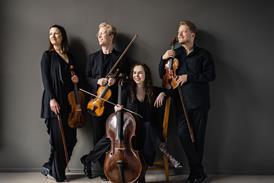- News
- For Subscribers
- Student Hub
- Playing Hub
- Podcast
- Lutherie
- Magazine
- Magazine archive
- Whether you're a player, maker, teacher or enthusiast, you'll find ideas and inspiration from leading artists, teachers and luthiers in our archive which features every issue published since January 2010 - available exclusively to subscribers. View the archive.
- Jobs
- Shop
- Directory
- Contact us
- Subscribe
- Competitions
- Reviews
- Debate
- Artists
- Accessories
Masterclass: Mendelssohn Variations Op. 17

British cellist Guy Johnston talks about dialogue, contrast and sense of line in the German composer’s Classical–Romantic work
Explore more Masterclasses like this in The Strad Playing Hub
Read more premium content for subscribers here
Mendelssohn wrote this work for his brother Paul in 1829, when the composer was 20. As we can see from the music, Paul must have been an accomplished amateur cellist! There are some tricky moments, but overall it is wonderfully lyrical and reminiscent of his Song without Words: it’s real chamber music, with a delightful dialogue between piano and cello. There is a feeling of tenderness and happy memory, and a sense that all’s well that ends well. It also has a nice connection with England, because Mendelssohn took it with him on his first sojourn there that same year. The cello was still gaining popularity at this time and it is interesting that here the cello part begins in a traditional, meandering gamba style to support the piano theme; but that gradually it rises up out of the depths into a virtuosic, leading role. There is a sense of development throughout: it starts calmly and warmly in a flowing D major Andante, then gathers momentum after Variations 1 and 2, into the più vivace Variation 3, allegro con fuoco Variation 4 and eventually the presto Variation 7, by which time Mendelssohn has built up a real storm before returning to calm in Variation 8. Be mindful of changes in inflection, bowings and phrase markings where material is repeated, but don’t let these get in the way of the theme. In the end the shape of each phrase governs itself: the markings just hint as to where the line is going, rather than giving explicit instructions. As you play, try also to have a feeling of improvisation and freedom in the moment. Keep the sense of an arc through from the opening theme to the final resolution. Inside that, of course, there’s a lot of fun and variation to be had.
Click here to view the sheet music for this work in our digital edition
Already subscribed? Please sign in
Subscribe to continue reading…
We’re delighted that you are enjoying our website. For a limited period, you can try an online subscription to The Strad completely free of charge.
* Issues and supplements are available as both print and digital editions. Online subscribers will only receive access to the digital versions.




























